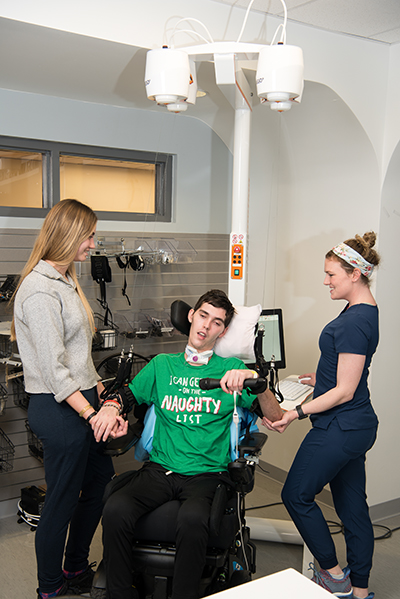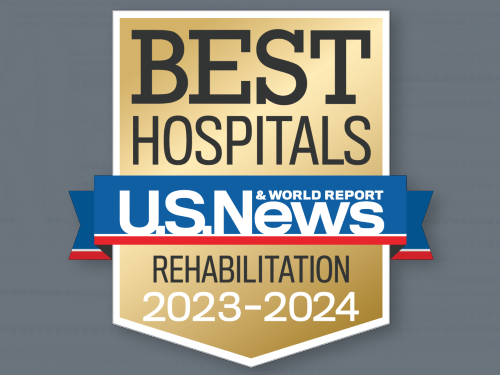
While visiting friends in College Station, Texas, from his hometown of San Antonio, 20-year-old River Rasmussen was in an automobile accident. The result was a traumatic brain injury.
“He was in the intensive care unit of a hospital in College Station for three months,” said his sister, Aryia Rasmussen. “Once he was medically stable, we were able to transfer him to a long term acute-care center in San Antonio.”
River was bedridden and mostly unresponsive; only occasionally would he squeeze Aryia’s hand. Although he did receive speech therapy during his stay, he also battled hydrocephalus and drug-resistant pneumonia—which landed him back in the ICU for a time, but ultimately, he was returned to a standard patient room.
“At that point, I was told that River may only ever be able to stick out his tongue,” said Aryia.
It was in the San Antonio hospital that Aryia learned about TIRR Memorial Hermann’s Disorders of Consciousness (DoC) program. The DoC program focuses on patients in a vegetative or minimally conscious state. These patients benefit from a referral to inpatient rehabilitation with a specialized program in treating disorders of consciousness. The DoC Program applies high-tech advances to assess and treat these patients to help maximize their potential recoveries and outcomes. “The nurses there thought that the program was excellent, and a social worker helped River get into TIRR,” said Aryia.
“It was completely different – there was hope at TIRR Memorial Hermann,” said Aryia. “From the time we arrived, we saw people enjoying being outside in their wheelchairs.” River began speech, occupational and physical therapy immediately upon arrival.
“When he first arrived, River needed complete assistance with everything,” said Megan Cleveland, OTR, MOT. “We worked on strengthening his arms so that he will eventually be able to drive a power wheelchair. We also worked on the mat a lot. When he first arrived, he could not sit on his own at all. But by the time he left he could sit on the mat with about 50% assistance. He can also grip his hairbrush or toothbrush… he has surpassed my expectations for him at this stage.”
“At first, River began to communicate ‘yes’ and ‘no’ with small, barely discernible head nods and shakes, or on days where he was extremely fatigued, tiny thumb movements,” said Elizabeth Anne Swenk, MS, CCCSLP. “We began to target his mouth movements and tongue movements to start waking up those muscles, and stimulate articulatory approximations so that he could mouth words to us. With the help of daily breath support exercises and music therapy to help stimulate singing, River started achieving voicing as well.” “River is saying words now,” said Aryia. “He has regained some strength. But most importantly, we know that he is conscious! We didn’t know that for certain before arriving at TIRR!”
Today, River is back at home in San Antonio and continuing outpatient therapy. “The special thing about River was his relationship with his sister,” said Physical Therapist Amy Briley, DPT, NCS. “Aryia was always there and willing to learn new things from the therapy team, and never complained no matter how uncomfortable the task. She always said ‘he would’ve done the same for me if the shoe was on the other foot.’”
Aryia will continue to be River’s caretaker at home in San Antonio. “I’m so excited to see how much River will accomplish!” said Aryia.

Nationally Ranked Rehabilitation
For the 34th consecutive year, TIRR Memorial Hermann is recognized as the best rehabilitation hospital in Texas and No. 4 in the nation according to U.S. News and World Report's "Best Rehabilitation Hospitals" in America.
Learn More